Gender Equity Bulletin, Issue 6, December 2015

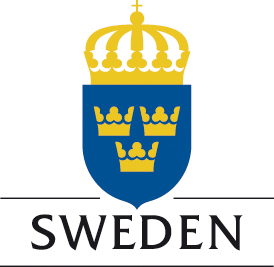

Issue 6, December 2015 - العدد رقم٦، كانون الأول ٢٠١٥
About the newsletter
Why the Gender Equity Newsletter?
This newsletter aims to connect gender actors and practitioners in Lebanon through the exchange expertise, in an attempt to create a space for better collaboration, networking, and equal access to knowledge, research, and information. Each issue will cover the work of actors, their activities, and projects, in addition to recommending relevant resources and tools, as well as information and statistics relevant to gender work in Lebanon
The gender equity newsletter is a part of the Gender Collaborative Information and Knowledge Network- a project by Lebanon Support in partnership with Diakonia
The Gender Collaborative Information and Knowledge Network is an online collaborative platform. It is part of Lebanon Support’sCivil Society Knowledge Centre (CSKC) and brings together civil society organizations, researchers, practitioners, and experts to enhance local and national capacities, improve access to knowledge and its development, and provide evidence-based research, information, and literature on gender issues and concerns.
لماذا نشرة العدالة الجندرية؟
تهدف هذه النشرة إلى الربط بين الجهات الفاعلة والعاملين في مجال إشكاليات النوع الاجتماعي في لبنان من خلال تبادل الخبرات، في محاولة لخلق مساحة للتشبيك وتفعيل التعاون، والمساواة في الوصول إلى المعرفة والأبحاث والمعلومات. يغطي كل عدد عمل الجهات الفاعلة وأنشطتها ومشاريعها، بالإضافة إلى الإيصاء بموارد وبأدوات ذات الصلة، وأيضاً المعلومات والإحصاءات ذات الصلة بالعمل في مجال إشكاليات النوع الاجتماعي في لبنان.
تشكل نشرة العدالة الجندرية جزءاً من شبكة معلومات العدالة الجندرية – مشروع لمركز دعم لبنان (Lebanon Support) بالشراكة مع دياكونيا Diakonia
ان شبكة معلومات العدالة الجندرية هي منصة تعاونية على الانترنت. وهي جزء من بوابة المعرفة للمجتمع المدني (CSKC) التابعة لمركز دعم لبنان، تجمع بين منظمات المجتمع المدني والباحثين والعاملين والخبراء لتعزيز القدرات المحلية والوطنية، وتحسين الوصول إلى المعرفة وتطويرها، وتقديم البحوث القائمة على الأدلة، بالإضافة إلى المعلومات والأدبيات في مجال قضايا النوع الاجتماعي.
1. Featured papers translated on the Gender Equity Information & Research Network - ترجمات لأوراق بحثية مختارة حول شبكة معلومات العدالة الجندرية
Lebanon Support has uploaded as a pdf file the translations to the two papers below, simply visit the page and click on “DOWNLOAD TRANSLATION AS PDF” to access it.
قام مركز دعم لبنان بتحميل نسختين مترجمتين عن الورقتين المشار إليهما أدناه كملفات PDF. قم ببساطة بزيارة الصفحة واضغط على زر "تنزيل الترجمة بنسخة PDF" لتتمكن من الولوج إليهما.
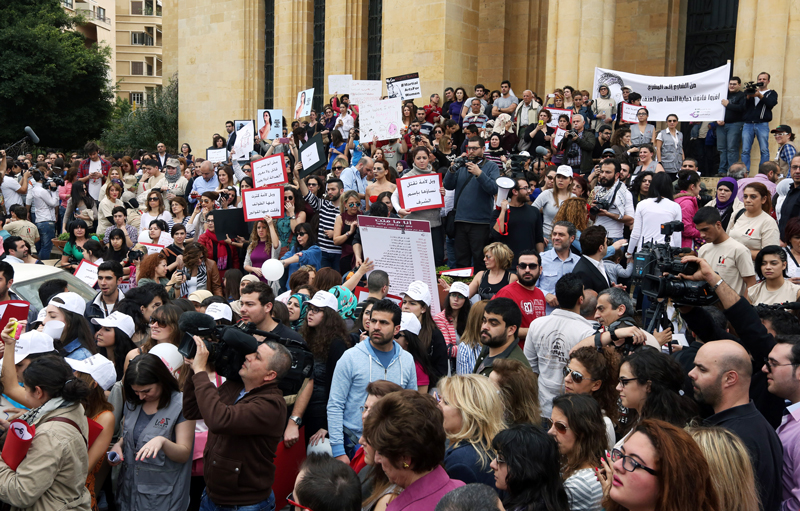
Gender politics in Lebanon and the limits of legal reformism - السياسات الجندرية في لبنان ومحدودية الاصالح القانوني
By: Riwa Salameh - روى سلامة
Women organizations in Lebanon have a long history of struggle towards gender equality. Perceptions concerning the achievements and status of women in Lebanese society suggests relative progress on issues related to rights and gender equality. This paper proposes an analysis of the status of women in Lebanon based on various indicators highlighting women’s participation in politics and decision-making processes and examining gender equality from the legal perspective and in terms of women’s economic status. It also looks into women’s achievements in terms of gender equality, reviewing some strategies adopted to enhance women’s status in Lebanon and highlighting their limits in the particular Lebanese socio-political context. Read more.
للمنظمات النسائية في لبنان تاريخ طويل من النضال من أجل المساواة بين الجنسين، ويمكن ملاحظة التقّدم النسبي في جملة من القضايا المتعلقة بالحقوق والمساواة الجندرية. تطرح هذه الورقة تحليلاً حول وضع المرأة في لبنان بناءً على عدة مؤشرات تسلط الضوء الضوء على مشاركة المرأة في الحياة السياسية وعمليات صنع القرار، بالاضافة إلى تقييم حالة المساواة بين الجنسين من منظور قانوني والوضع الاقتصادي للمرأة. وتنظر هذه الورقة كذلك إلى إنجازات المرأة من حيث المساواة بين الجنسين، وتراجع بعض الاستراتيجيات المعتمدة لتعزيز وضع المرأة في لبنان، وذلك لتسليط الضوء على محدوديتها في السياق الاجتماعي والسياسي اللبناني. اضغط هنا لتحميل الملف.

Transwomen’s Navigation of Arrest and Detention In Beirut: A Case Study - تجربة النساء الترانس مع الاعتقال والاحتجاز في بيروت: دراسة ميدانية
By: Ahmad J. Saleh and Adriana A. Qubaia - أحمد صالح وأدريانا قبيعة
Informal activist narratives in Lebanon rightfully cite that trans* people are subjected to a higher risk of arrest due, in part, to their perceived hyper-visibility as gender-binary-breakers as well as their economic marginalization, which makes them particularly vulnerable to increased policing. We view arrest and detention as processes that define and re-enable gender- and body-policing rather than endpoints or markers of discrimination in themselves. Five transwomen were selected for a post-release semi-structured interview about the circumstances of their arrest and detention. All women have been detained using one of the penal code articles under study; 209/531, 521, 523-6, and 534. Based on these interviews, we argue that transwomen are more likely to be subjected to longer detention spans due to a system of detention and criminalization that breaks existing community ties and makes it difficult for transwomen to navigate their detention and release processes. Read more.
تشير الخطابات غير الرسمية للناشطين والناشطات في لبنان إلى أن تعرض الأشخاص المتحوّلين/ات أو المتغيّرين/ات جنسياً (ترانس*) في لبنان لخطر الاعتقال بشكل اكبر يعود جزئياً إلى ما يمكن وصفه بالظهور البارز (hypervisibility) الذي يتحدى الثنائية الجندرية النمطية ويكسرها، بالإضافة إلى تهميشهم/ن اقتصادياً. كلا العاملين يجعلانهم/هن أكثر عرضة للرقابة البوليسية من غيرهم/ن. وبالنسبة لنا، فإن الاعتقال والاحتجاز ليسا معايير لمجرد التمييز فحسب، بقدر ما يشكلان عملية تقوم بتثبيت وإعادة تمكين السيطرة البوليسية على الجسد والنوع الاجتماعي (الجندر).
وقد اخترنا خمسة نساء-ترانس وعقدنا مقابلات شبه منظمة معهن حول ظروف اعتقالهن وحجزهن، بعد أن تم الإفراج عنهن. وقد تم اعتقالهن جميعاً تحت إحدى مواد قانون العقوبات قيد الدراسة: ٢٠٩/٥٣١، ٥٢١، ٥٢٣-٦، ٥٣٤. بناء على هذه المقابلات، سوف نوضّح كيف أن النساء-الترانس هن عرضة للاحتجاز لفترات أطول بسبب نظام الاحتجاز والتجريم نفسه الذي يقطع العلاقات المجتمعية القائمة ويعقّد قدرة النساء-الترانس تحديداً على التعامل مع عمليات الاعتقال والإفراج. اضغط هنا لتحميل الملف.
*NOTE: these papers have been published in English in the first issue of the Civil Society Review, available for sale at Virgin Megastore or at our office in Furn el-Chebbak.
هذه الأوراق البحثية نُشرت باللغة الانكليزية في العدد الاول من مجلة المجتمع المدني - Civil Society Review ، وهي معروضة للبيع في كافة فروع فيرجين ميغاستور - Virgin Megastore أو في مكتبنا في فرن الشباك.
-----------------------------------------------------------------------------------------------------------------------------------------
The Civil Society Review, our newest publication, and the first peer-reviewed journal on civil society issues in Lebanon, is for sale at our office and in all branches of Virgin Megastore.
For more info, contact us on: contact@lebanon-support.org
A preview is available here.
مجلة المجتمع المدني - Civil Society Review هي أحدث منشوراتنا والمجلة الأولى التي يستعرضها الأقران حول قضايا المجتمع المدني في لبنان. هذه المجلة معروضة للبيع في مكتبنا وفي كافة فروع فيرجين ميغاستور - Virgin Megastore.
للمزيد من المعلومات، يمكن التواصل معنا على العنوان التالي contact@lebanon-support.org
لإلقاء نظرة عامة على المجلة، إضغط هنا.
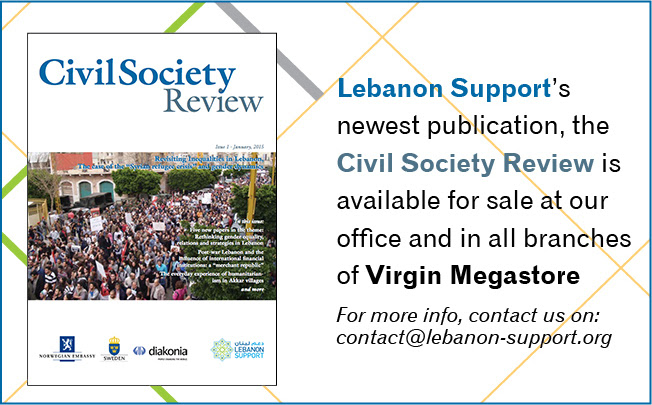
-----------------------------------------------------------------------------------------------------------------------------------------
2. New feature on the Gender Equity Network: Event summaries & audio - جديد على شبكة العدالة الجندرية: ملخص عن الأنشطة وتسجيلات صوتية
You can now access on the Gender Equity Network’s webpage summaries of our round-table series that took place in 2014 and 2015, follow this link for all summaries.
يمكنك الآن الولوج إلىصفحة شبكة العدالة الجندرية لقراءة ملخّص عن سلسلة الطاولات المستديرة التي نظّمناها في العامين 2014 و2015. إضغط على هذا الرابط للإطلاع على الملخّصات كلّها.
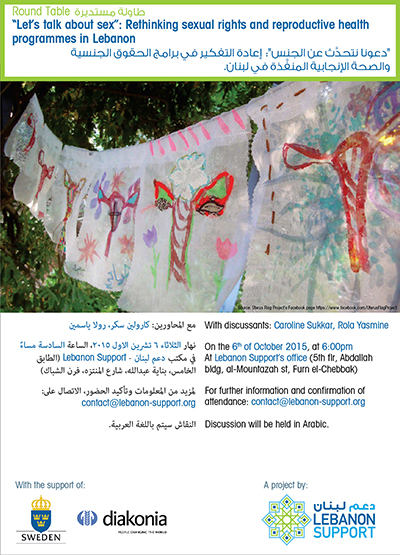
“‘Let’s Talk about Sex’: Rethinking sexual rights and reproductive health programmes in Lebanon”
"دعونا نتحدَّث عن الجنس": إعادة التفكير في برامج الحقوق الجنسية والصحة الإنجابية المنفَّذة في لبنان.
October 6, 2015 - ٦ تشرين الثاني ٢٠١٥
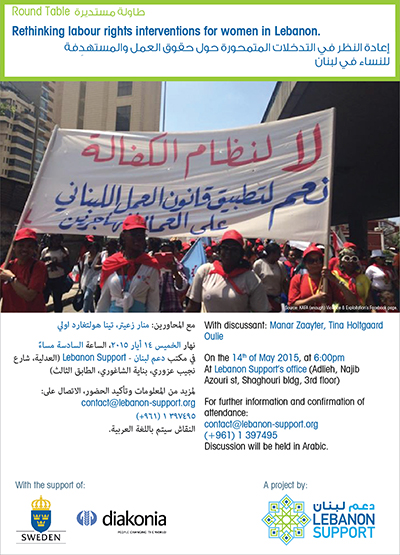
“Rethinking labour rights interventions for women in Lebanon”
إعادة النظر في التدخلات المتمحورة حول حقوق العمل والمستهدِفة للنساء في لبنان
May 14, 2015 - ١٤ أيار ٢٠١٥
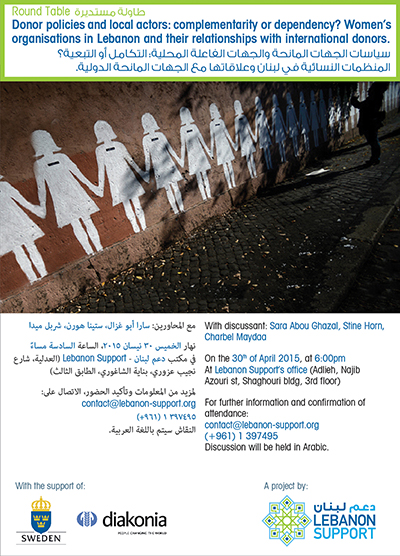
“Donor policies and local actors: complementarity or dependency? Women’s organisations in Lebanon and their relationships with international donors”
سياسات الجهات المانحة والجهات الفاعلة المحلية: التكامل أو التبعية؟ المنظمات النسائية في لبنان وعلاقاتها مع الجهات المانحة الدولية
April 30, 2015 - ٣٠ نيسان ٢٠١٥
3. FOCUS ON - أضواء على
Lebanon Support’s Gender Equity Network
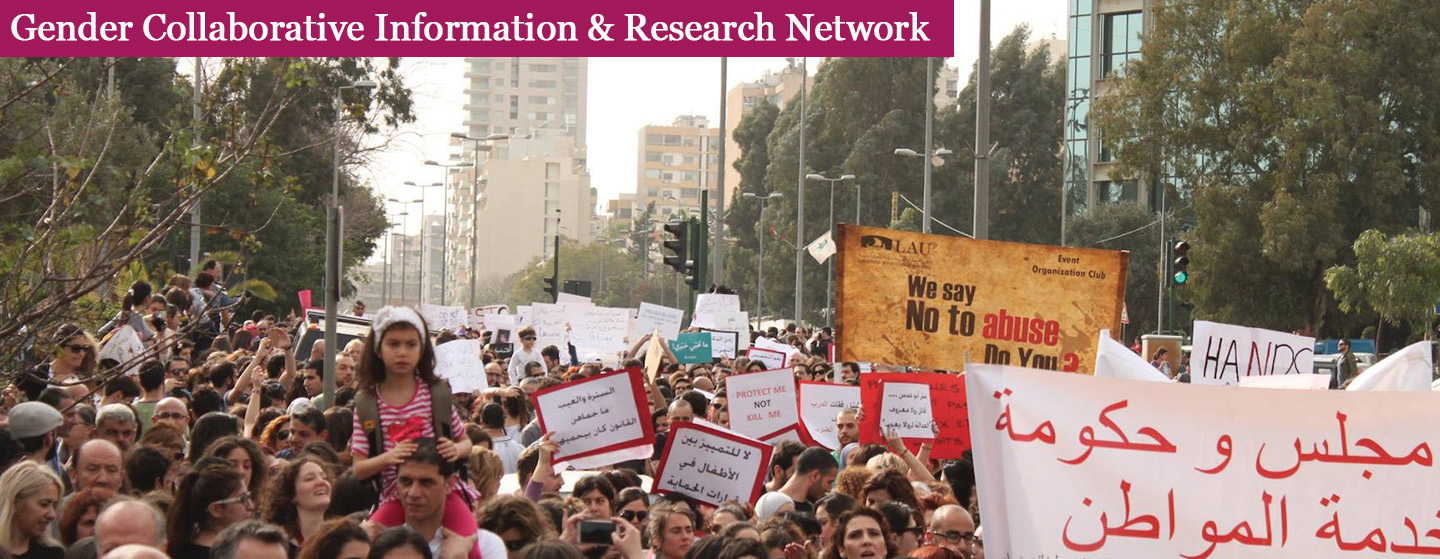
.Lebanon Support is a non-profit research centre for and about civil society in Lebanon
Lebanon Support launched in 2014 the Gender Equity Network (GEN), part of the Civil Society Knowledge Centre. The aim of our GEN is to bring together civil society organizations, researchers, practitioners and experts working together to enhance the development of, and access to knowledge and evidence-based research on gender issues and concerns. Similar to the rest of Lebanon Support’s projects, the GEN adopts a multidisciplinary approach and evidence and fact-based methodologies that aim to to support and develop a civic voice and a better impact towards better accountability and societal change in Lebanon. It features, among others, papers, reports, interactive mappings, a resource library, and new content is constantly being developed.
Within the GEN, Lebanon Support will be publishing in January 2016 an “Overview of gender actors and interventions in Lebanon: between emancipation and implementation”, based on extensive fieldwork undertaken in 2015. The main findings of the report highlight the main challenges facing gender actors in Lebanon: on the one hand, unbalanced relationships with donors and, on the other hand, short-term projects that notably seem to be hindering coordination efforts.
In this context, Lebanon Support believes the main demands of gender actors should focus on lobbying their own donors to implement needs-based projects, according to their strategic plans. Lebanon Support also believes that additional efforts should be made at the coordination level among all gender actors operating in Lebanon.
دعم لبنان مركز أبحاث لا يبغي الربح متخصص بالمجتمع المدني في لبنان ويُعنى بقضاياه.
في العام 2014، أطلق مركز دعم لبنان شبكة العدالة الجندرية التابعة لبوابة المعرفة للمجتمع المدني (CSKC). تهدف شبكتنا إلى أن تشكِّل صلة وصل بين منظمات المجتمع المدني والباحثين والممارسين وأصحاب الإختصاص والخبراء الذين يعملون معاً من أجل تطوير المعارف والبحوث المستندة إلى الأدلة حول قضايا النوع الإجتماعي ومشاغلها وضمان الوصول إليها. وكما في مشاريع مركز دعم لبنان الأخرى، تتبنّى شبكة العدالة الجندرية مقاربة متعدِّدة الإختصاصات ومنهجيات قائمة على الإثباتات والوقائع بغية دعم الصوت المدني وتطويره وترك أثر أفضل بما يحسِّن المساءلة والمحاسبة والتغيير المجتمعي في لبنان. وينطوي ذلك على نشر أوراق بحثية وتقارير وخرائط تفاعلية وتطوير مكتبة الموارد، مع تحديث المحتوى باستمرار.
وضمن شبكة العدالة الجندرية، سينشر مركز دعم لبنان في كانون الثاني/يناير من العام 2016 "لمحة عامة عن الأطراف الفاعلة في مجال الجندر وتدخلاتها في لبنان: بين التحرُّر والتنفيذ"، مستنداً إلى العمل الميداني الشامل الذي أُنجز في العام 2015. تضيء النتائج الأساسية التي خلًص إليها هذا التقرير على التحديات الأساسية التي تواجهها الأطراف الفاعلة الناشطة في قضايا النوع الإجتماعي في لبنان. بمعنى آخر، تسلِّط الضوء على العلاقات غير المتوازنة مع الجهات المانحة من جهة وعلى المشاريع قصيرة الأجل التي تعيق جهود التنسيق من جهة أخرى.
وفي هذا السياق، يعتبر مركز دعم لبنان أنّه يجب على الأطراف الفاعلة المعنية بقضايا النوع الإجتماعي أن تحصر مطالبها الأساسية بالضغط على جهاتها المانحة لحثِّها على تنفيذ مشاريع تبرز الحاجة إليها وفقاً لخططها الإستراتيجية. كذلك، يرى المركز أنّه لا بد للأطراف الفاعلة كلِّها والمعنية بقضايا النوع الإجتماعي في لبنان أن تكثف جهودها على مستوى التنسيق في ما بينها.
4. Gender news
-
From Lebanon
According to the 2015 edition of the World Economic Forum’s Global Gender Gap Index, Lebanon ranked 138th out of 145 countries.
The Judge of Urgent Matters in Nabatieh, Ahmad Mezher, issued a ruling granting protection from physical and moral violence to a pregnant woman. In his ruling, Judge Mezher compelled the woman’s husband not to abuse her, at the risk of paying a compulsory fine of US$1,000 for each violation.
After a bill allowing people of Lebanese origins to reclaim their citizenship was put on the agenda of a parliamentary session, among other so-called ‘urgent matters’ that the Parliament had to look into,My Citizenship is a Right for Me and My Family Campaign organized on 4 Novembera sit-in at the entrances of the Grand Serail and the Parliament in Riad Solh Square. The move was meant to protest the endorsement of the expatriates’ right to citizenship, at a time when Lebanese women are still denied their right to full-citizenship
-
Around the world
Saudi Arabian women participate for the first time in municipal council election, with at least 17 women elected. The powers of municipal councils are limited to advising local government and helping oversee budgets, but the election has still been hailed by women activists as a crucial first step towards achieving wider rights and broadening the understanding of civic engagement.
In Brazil, during the month of October, a lower chamber's commission approved a bill seeking to limit access to the morning-after pill and information on abortion for rape victims, spurring thousands to gather in Rio de Janeiro and other cities of the country in order to protest against the bill which restricts women's reproductive rights
In a departure from previous publications, the Pirelli 2016 calendar features mostly fully-dressed women (with only two exceptions) all chosen for their achievements. The calendar, shot by Annie Leibovitz, is seen as signaling a cultural shift in the way women are represented.
-
أخبار من لبنان
احتل لبنان المرتبة 138 من بين 145 دولة، بحسب مؤشر الفجوة بين الجنسين الدولي للعام 2015 والصادر عن المنتدى الإقتصادي العالمي.
اصدر قاضي الامور المستعجلة في النبطية احمد مزهر قرارا قضى بحماية امرأة حامل من العنف الذي تتعرض له مادياً ومعنوياً. والزم القاضي مزهر في قراره زوج المرأة بعدم التعرض لها تحت طائلة غرامة اكراهية مقدارها الف د.أ عن كل مخالفة لهذا المنع.
رداً على إدراج مشروع قانون استعادة الجنسية للمتحدرين على جدول أعمال جلسة تشريع الضرورة، نظمت حملة "جنسيتي حق لي ولأسرتي"، في 4 تشرين الثاني الماضي، اعتصاماً عند مدخلي السرايا الحكومية ومجلس النواب في ساحة رياض الصلح، وذلك رفضاً لإقرار حق المغتربين في الجنسية قبل حصول اللبنانيات على حقهن في المواطنة الكاملة.
-
أخبار من حول العالم
تشارك المرأة السعودية للمرة الأولى في انتخابات المجالس البلدية، مع انتخاب ما لا يقل عن 17 امرأة. تقتصر صلاحيات المجالس البلدية على تقديم النصح والمشورة إلى الحكومة المحلية والمساعدة في الإشراف على الموازنات. غير أنّ الناشطات يثمِّن الإنتخابات باعتبارها خطوة أولى أساسية نحو توسيع مروحة الحقوق وتعزيز فهم الإنخراط المدني.
في تشرين الأول/أكتوبر، أقرت لجنة الغرفة الدنيا في البرازيل مشروع قانون يحدّ من إمكانية حصول ضحايا الإغتصاب على حبوب منع الحمل الطارئ ومعلومات حول الإجهاض، الأمر الذي دفعبالآلاف إلى التجمهر في ريو دي جانيرو ومدن أخرى في مختلف أنحاء البلاد إحتجاجاً على مشروع القانون الذي يقيِّد حقوق المرأة الإنجابية.
تنشر روزنامة بيريللي للعام 2016 صوراً لنساء ظهرن بمعظمهنّ بكامل أناقتهنّ (باستثناء اثنتين منهما) وقد وقع الإختيار عليهنّ على خلفية إنجازاتهنّ، في خطوة خالفت ما اعتادت عليه الروزنامة في إصداراتها السابقة. والروزنامة التي التقطت آني ليبوفيتز صورها تجسِّد تحوّلاً ثقافياً في طريقة تمثيل المرأة.

